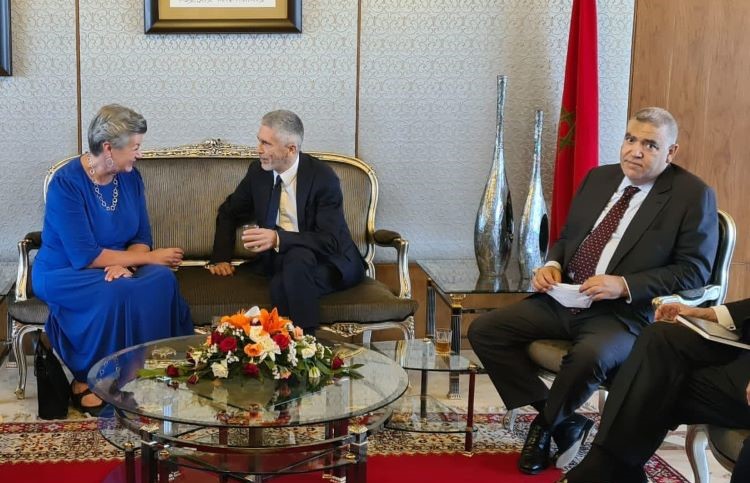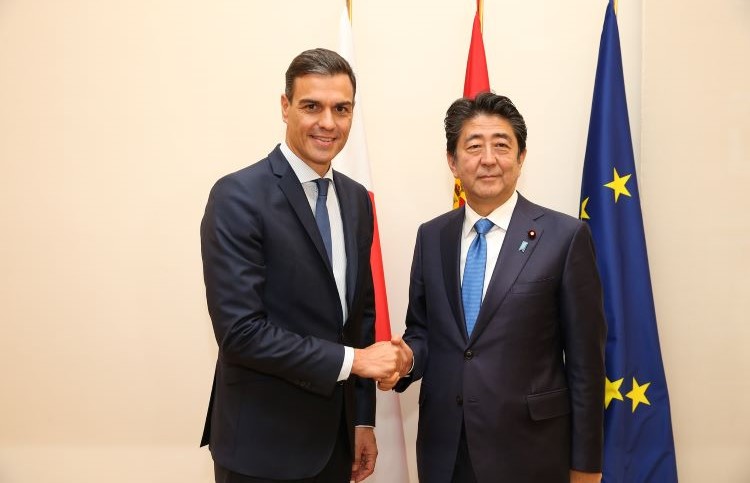The Diplomat
The Minister of Interior, Fernando Grande-Marlaska, and the European Commissioner for Home Affairs, Ylva Johansson, met yesterday in Rabat with his Moroccan counterpart, Abdelouafi Laftit, to address, among other issues, the “painful events” in Melilla.
During the meeting, according to the joint press release, the Commissioner and the two ministers pledged to promote a new partnership between Morocco and the European Union that will include the creation of mechanisms to “tackle the new operational methods used by criminal organizations involved in human trafficking”.
They also expressed their sorrow for the death of at least 23 migrants during the “painful events” that took place last June 24 at the Melilla fence and regretted the injuries suffered, among others, by members of the Moroccan and Spanish Security Forces. “These events, in addition to constituting a human tragedy, put to the test the traditional devices for combating human trafficking and demonstrate the extreme dangerousness of human trafficking networks and the risks they are willing to generate,” reads the joint note. They also highlighted the investigations being carried out to clarify the circumstances of these events.
At least 23 people died last June 24 during an assault on the Melilla fence, in circumstances that have not yet been duly clarified. The President of the Government, Pedro Sanchez, was harshly criticized for his first reaction to the tragedy, when he stated that the crisis had been “well resolved”, although days later he tried to make amends by assuring that he had not seen the images in which the deceased immigrants were seen piled up.
Since then, there has been a succession of demands for an investigation into the facts, both from the minority partners of the Government (Unidas Podemos), as well as from the opposition and international organizations. Half a hundred European parliamentarians (including the MEP of Unidas Podemos Sira Rego) have demanded the European Commission to open an investigation and “establish responsibilities” for what happened. Among the addressees of the proposal were the EU High Representative for Foreign Policy, Josep Borrell, Ylva Johansson herself and the Commissioner for the Neighborhood, Oliver Varhelyi.
Last Monday, Commissioner Johansson expressed, before the plenary of the European Parliament, her support for “the calls of the United Nations and the African Union for an investigation into this tragic loss of life.” “I welcome the fact that, in the meantime, the Spanish Public Prosecutor’s Office is conducting an investigation and that, in Morocco, the National Human Rights Commission has launched a fact-finding mission,” she added.
Cooperation mechanisms against human trafficking
On the other hand, the new mechanisms of operational cooperation in the fight against human trafficking between Morocco and the European Commission, discussed during yesterday’s meeting in Rabat, will mainly include support for border management, strengthening police cooperation, including the conduct of joint investigations, raising awareness of the dangers of irregular immigration and strengthening cooperation with European Union agencies.
“In the area of migration, Spain works resolutely in cooperation with the countries of origin and transit and in the fight against the mafias that traffic in people, both through the exchange of operational information and through joint actions,” according to the Ministry of the Interior. The mechanisms established in these areas make it possible to stop 40 percent of irregular migratory movements at source, “which also leads to 40 percent fewer lives being put at risk in crossings,” he added. For its part, the European Commission is working, within the framework of the new Pact on Migration and Asylum, on the implementation of cooperation mechanisms in migratory matters with the countries of origin and transit.







